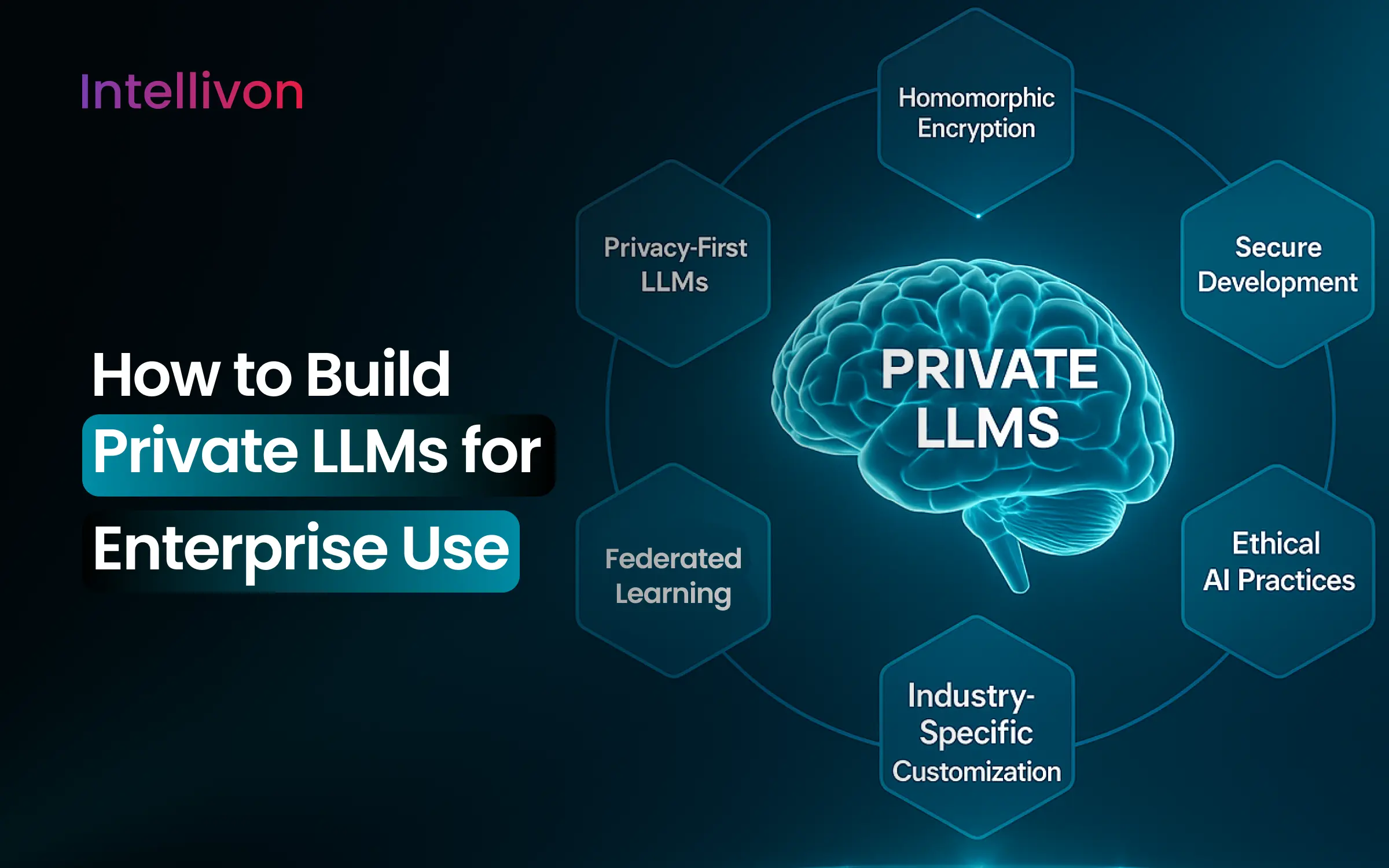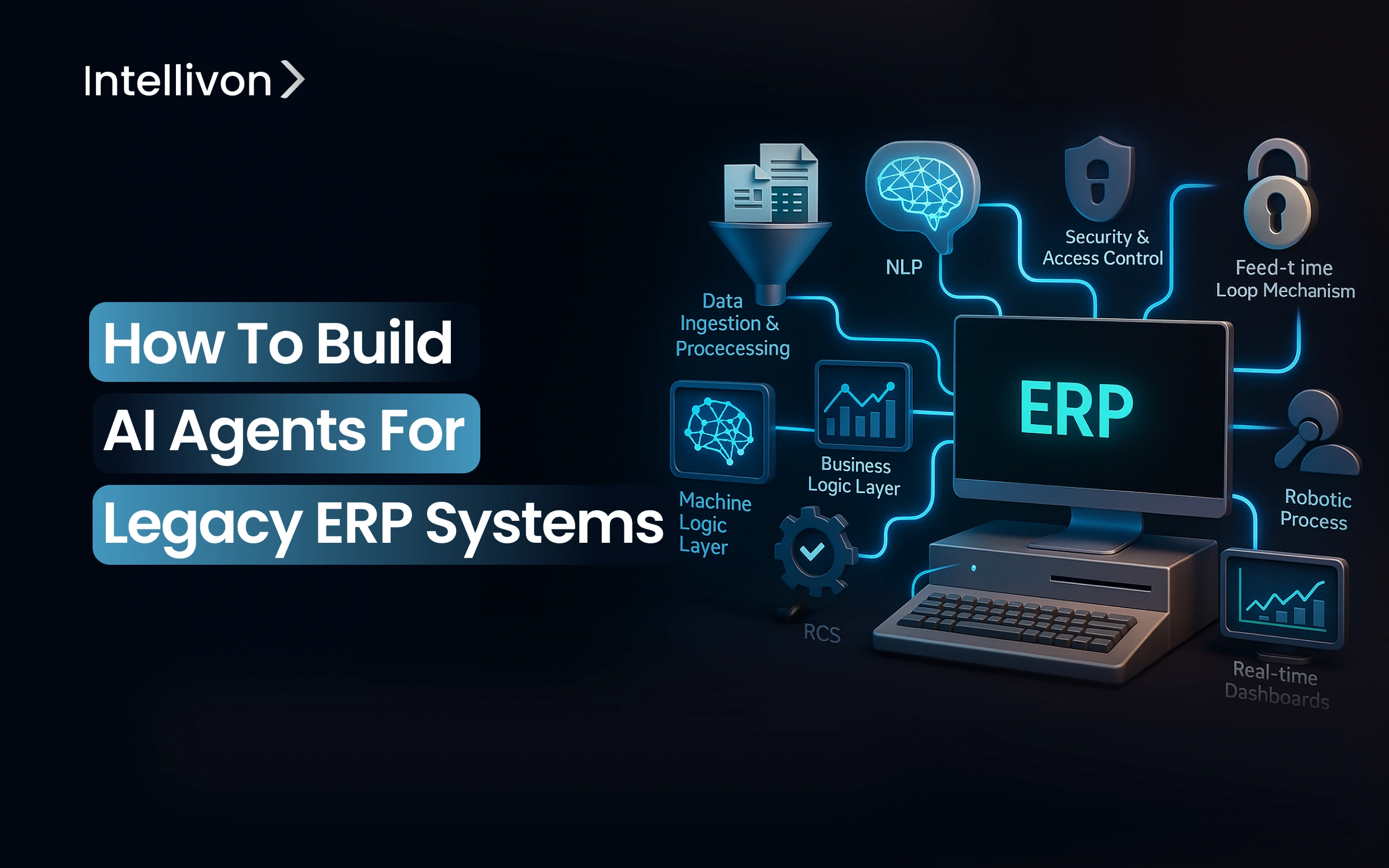Legacy platforms are deeply embedded in enterprise-critical processes and continue to serve mission-critical tasks. Enterprises have built a long-term trust in these systems, so replacing them entirely is not only risky but also cost-prohibitive and time-consuming. A common myth is that you must completely overhaul your ERP to benefit from AI Agents. That’s far from the truth. Modern AI Agents can work alongside existing systems without disrupting operations. You don’t need to rip and replace to innovate.
AI agents offer a smarter approach. Acting as an augmentation layer, they bring intelligence, automation, and agility to even the oldest ERP systems. Walmart, an early adopter of SAP’s HANA can now process a huge amount of transaction data faster. Whether it’s automating repetitive tasks or delivering predictive insights, AI agents modernize legacy ERP systems without tearing them apart, making ERP AI augmentation a low-risk, high-reward move for large enterprises.
In this blog, we will cover how AI Agents work in legacy ERP systems, why your enterprise needs them, how Intellivon builds AI Agents for your legacy ERPs, and how we keep them optimized to avoid common pitfalls. At Intellivon, our AI experts have hands-on experience building agents that seamlessly integrate into ERP systems and evolve with your enterprise growth.
What Are AI Agents in the ERP Context and Why Should You Care?
AI agents in the ERP context are software programs powered by technologies like machine learning (ML) and natural language processing (NLP). Unlike basic automation tools, they learn from data, respond to user queries, and adapt to changing conditions.
They work directly within or around your ERP environment. Whether it’s SAP ECC, Oracle EBS, or JD Edwards, these agents can fetch reports, update records, detect anomalies, and communicate results through chat interfaces or dashboards.
Think of an ERP AI agent as a 24/7 intelligent co-worker. It understands business logic. For example, It can auto-generate financial summaries, flag unusual transactions in real time, alert purchasing teams about low stock, and schedule workflows across departments And because these agents use natural language, non-technical users can interact with them easily, removing ERP complexity for everyone involved.
The Perfect Time To Integrate AI Agents into Legacy ERPs
The global AI in ERP market is projected to grow from USD 4.5 billion in 2023 to USD 46.5 billion by 2033, with North America leading the market, holding 38.4% share and generating USD 1.72 billion in revenue in 2023, according to Market.US.
Take a look at these jaw-dropping statistics on the swift adoption of agentic AI in legacy ERP systems:
- Over 60% of new enterprise AI deployments in 2025 will include autonomous, goal-seeking AI agents in workflows, including legacy ERPs like SAP ECC, Oracle EBS, and JD Edwards.
- 29% of organizations are already using agentic AI, and 44% plan to implement it within the next year to improve efficiency and reduce costs.
- 20% of enterprises are already using AI agents in their business operations, with adoption expected to rise by nearly 50% by the end of 2025.
- 19% of Fortune 500 companies have fully automated financial reconciliation in legacy ERPs with agentic AI, especially for finance functions.
- 93% of U.S. IT executives are highly interested in agentic AI for enterprise platforms, and 32% plan to invest within the next six months.
Enterprises are quickly adopting agentic AI to improve and modernize their legacy ERP systems, showing that the technology has evolved from a concept to a key driver of change.
Why Enterprises Hesitate To Integrate AI Agents With Legacy ERP Systems
AI agents offer powerful benefits for legacy ERP systems. They bring automation, intelligence, and speed to platforms that were never designed for agility. Yet despite these advantages, many enterprise leaders remain cautious, and understandably so. Knowing why hesitation exists is the first step to overcoming it.
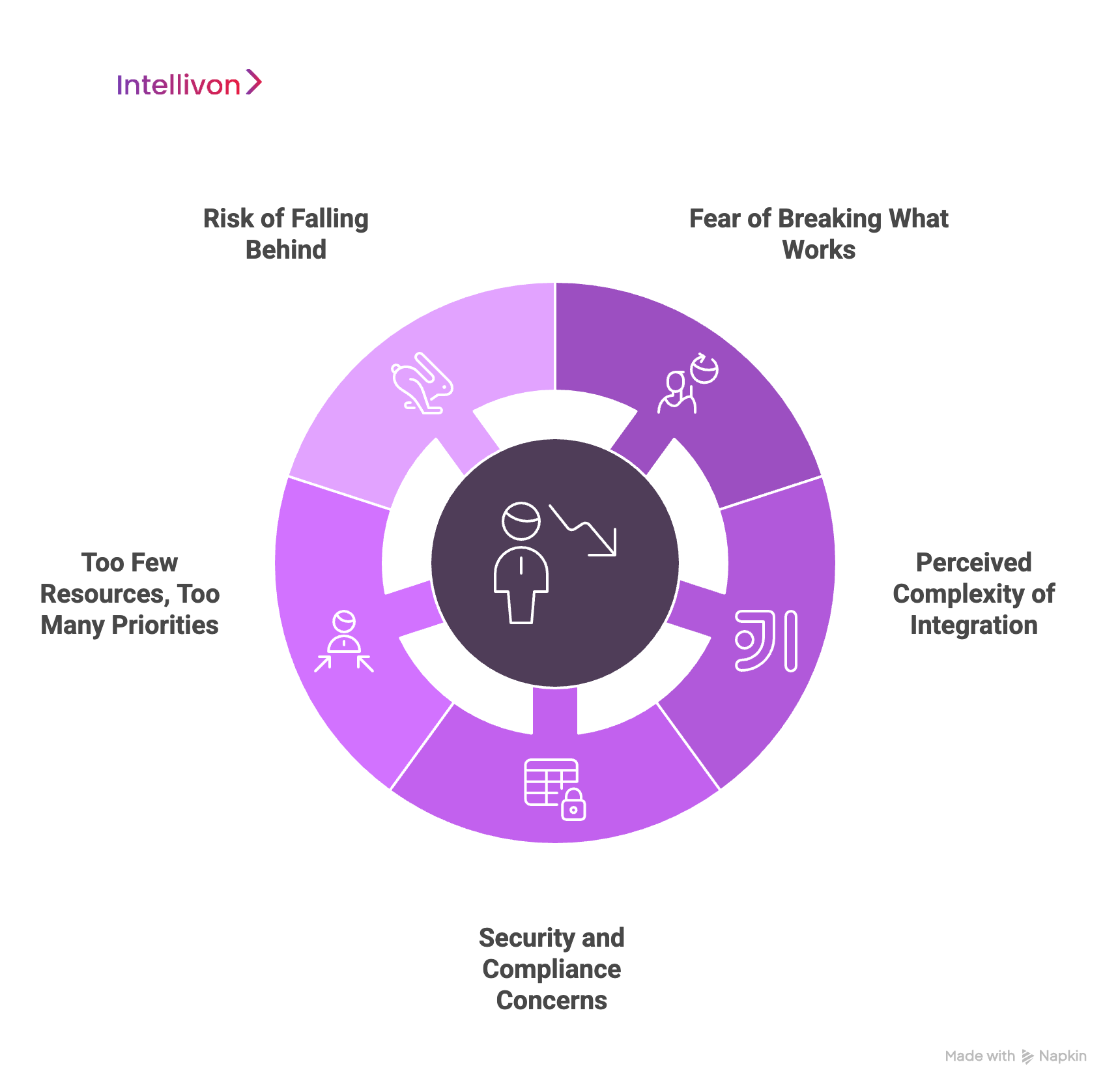
1. Fear of Breaking What Works
Legacy ERP systems have kept businesses running smoothly for years. They manage payroll, inventory, compliance, and financial reporting across complex, global operations. For many CFOs and IT leaders, the idea of introducing anything new into this well-oiled machine feels risky. The thought is simple: if it isn’t broken, why fix it? This fear of disrupting critical systems often outweighs the potential rewards of innovation, especially when millions of dollars flow through these platforms daily.
2. Perceived Complexity of Integration
Another common concern is the assumption that AI agent integration is too complicated. Enterprise leaders often believe that connecting modern AI tools to systems built on outdated frameworks like COBOL or early SAP modules will require massive overhauls. The reality is that most legacy systems have custom workflows and business logic that are deeply embedded. Many fear that AI agents won’t be able to navigate this complexity without rewriting the entire architecture. This perception creates a mental roadblock before any technical assessment even begins.
3. Security and Compliance Concerns
For industries governed by strict regulations, such as healthcare, finance, and manufacturing, security is always top of mind. The idea of inserting AI into environments with sensitive customer data, financial records, or proprietary IP triggers anxiety. Compliance officers worry about maintaining control, audit visibility, and proper data handling when autonomous agents are introduced. The risk feels too high, even when safeguards exist.
4. Too Few Resources, Too Many Priorities
IT departments are already under pressure. Maintaining aging ERP systems, managing daily operations, and addressing technical debt leaves little room for new initiatives. The idea of taking on AI integration, especially without internal expertise, feels like more strain than value.
5. Risk of Falling Behind
While these concerns are real, they can be addressed. The greater risk lies in doing nothing. As competitors embrace intelligent automation, organizations that delay AI adoption fall behind in agility, efficiency, and decision speed. 60% of enterprises are already putting in their hats and adopting Agentic AI for their legacy ERPs. The smarter move is to adopt and integrate it, with expert guidance.
Real World Applications of AI Agent-ERP Integrations
Across sectors, industry leaders are deploying AI agents to modernize legacy ERP systems, unlocking new levels of speed, efficiency, and intelligence. These real-world examples show how intelligent ERP AI automation is already solving problems for some of the world’s most complex enterprises.
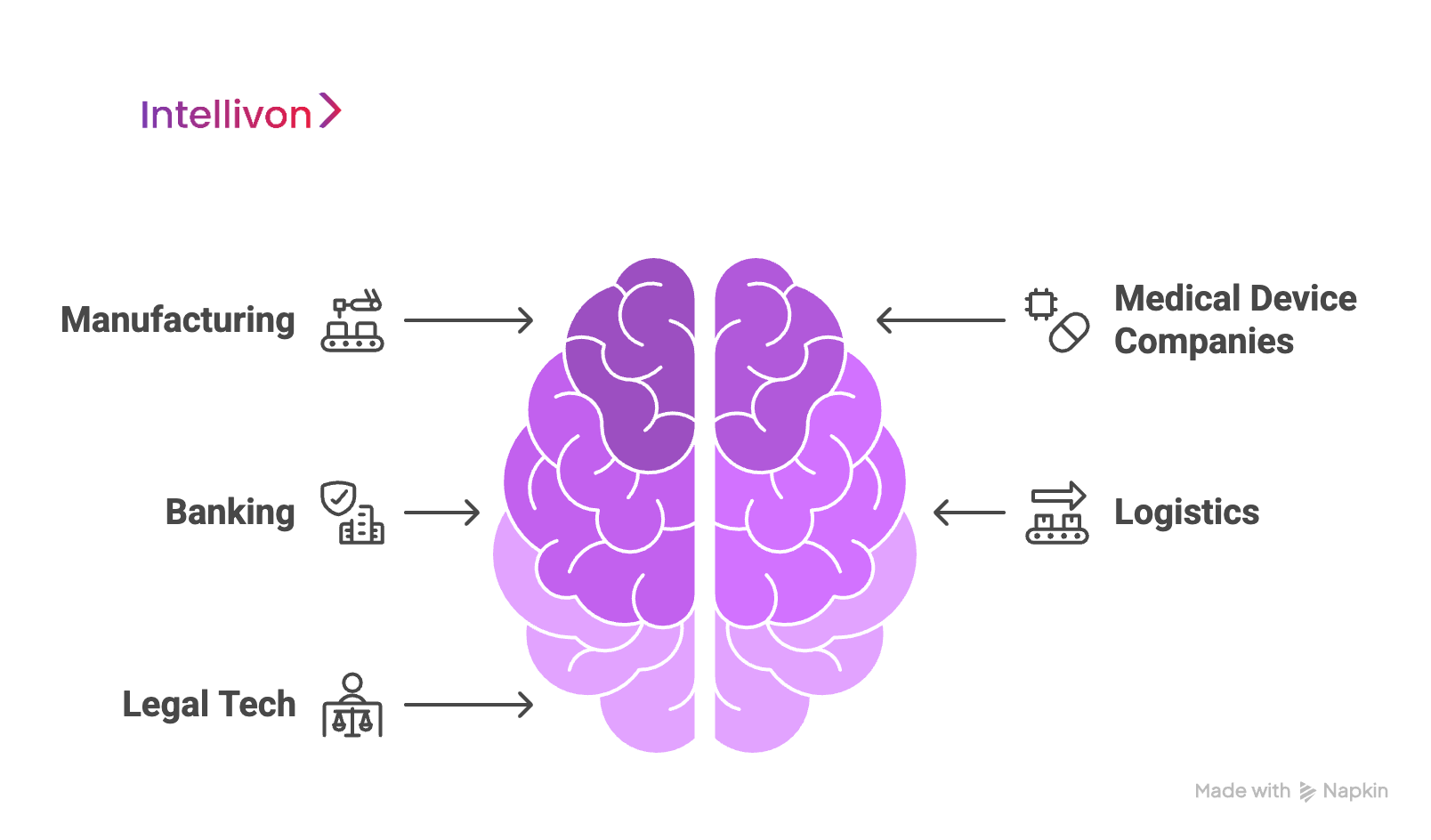
1. Manufacturing
Companies like Siemens and General Electric are bringing intelligence to the factory floor through ERP-integrated AI agents.
1. Predictive Maintenance
Siemens integrates AI agents with IoT sensors to predict machine failures before they occur. These agents work inside their ERP to trigger proactive maintenance schedules, dramatically reducing downtime and repair costs.
2. Smart Scheduling
General Electric uses ERP-based AI agents to optimize production workflows. These agents analyze supply chain data, staffing constraints, and machine availability to adjust schedules in real time and avoid bottlenecks.
3. Inventory Optimization
Bosch leverages AI agents to maintain lean inventory across its global operations. The ERP-integrated system automatically adjusts stock levels based on predictive analytics tied to sales and manufacturing data.
2. Medical Device Companies
Leaders like AmerisourceBergen and Medtronic are transforming healthcare operations using ERP AI augmentation.
1. Dynamic Pricing
AmerisourceBergen replaced manual pricing with AI agents inside its ERP. These agents analyze transaction history, product costs, and even weather data to generate optimal pricing strategies, cutting daily admin time by over 80%.
2. Workflow Automation
Medtronic has deployed AI agents to streamline procurement and pricing workflows. Their ERP now identifies supply delays early, suggests alternative suppliers, and ensures compliance with FDA tracking standards.
3. Compliance Accuracy
Becton Dickinson uses ERP agents to maintain accurate compliance documentation across its global distribution channels. These agents validate product data in real time and log every change for audit purposes.
3. Banking
Top financial firms are leaning on AI-driven ERP solutions to improve controls and detect risks faster.
1. Fraud Prevention
JPMorgan Chase implemented ERP-integrated AI agents that monitor real-time transaction flows. The system automatically flags unusual payments, duplicate invoices, and vendor behavior, helping prevent millions in potential losses.
2. Audit Trail Automation
Wells Fargo uses ERP agents to create always-on audit trails. These agents log transactions, flag inconsistencies, and accelerate reporting cycles during compliance reviews.
3. Spend Visibility
HSBC employs AI agents for intelligent spend analysis across departments. Their ERP now surfaces cost inefficiencies and abnormal procurement patterns before they spiral.
4. Logistics
Global logistics leaders are modernizing legacy systems with AI agents that deliver speed, precision, and end-to-end visibility.
1. Shipment Tracking at FedEx
FedEx uses ERP-integrated AI agents to update delivery status, monitor freight movement, and alert stakeholders in real time, enhancing customer service and operational accuracy.
2. Dynamic Routing at DHL
DHL’s logistics engine now includes AI agents that react to traffic, customs delays, or weather events. Their ERP dynamically reschedules routes to minimize disruption and reduce delivery time.
3. PO Automation at Maersk
Maersk’s ERP agents adjust purchase orders on the fly based on container availability, port congestion, and real-time demand forecasts, optimizing cost and delivery precision.
5. Legal Tech
Progressive law firms and legal tech platforms are embedding AI agents into ERP systems for smarter workflows and audit-ready operations.
1. Case Intelligence
Clifford Chance integrates AI agents with its ERP to monitor case documents and deadlines. These agents scan filings, track timelines, and reduce the risk of missed court actions.
2. Invoice Accuracy
Thomson Reuters uses ERP AI agents to validate client invoices. The agents flag rate discrepancies, missing entries, and incorrect tax codes, ensuring billing accuracy and client trust.
3. Document Management
Baker McKenzie’s ERP system now includes AI agents that auto-classify and tag legal documents. This automation has reduced document processing time and improved knowledge management across global teams.
Five Critical Agent Types for Legacy ERP Success
To modernize without disrupting operations, enterprises are deploying five specialized AI agent types, each solving a critical legacy ERP challenge. Combined with enabling technologies like microservices, API gateways, and event-driven architecture, these agents bring intelligence, agility, and scalability to outdated systems.
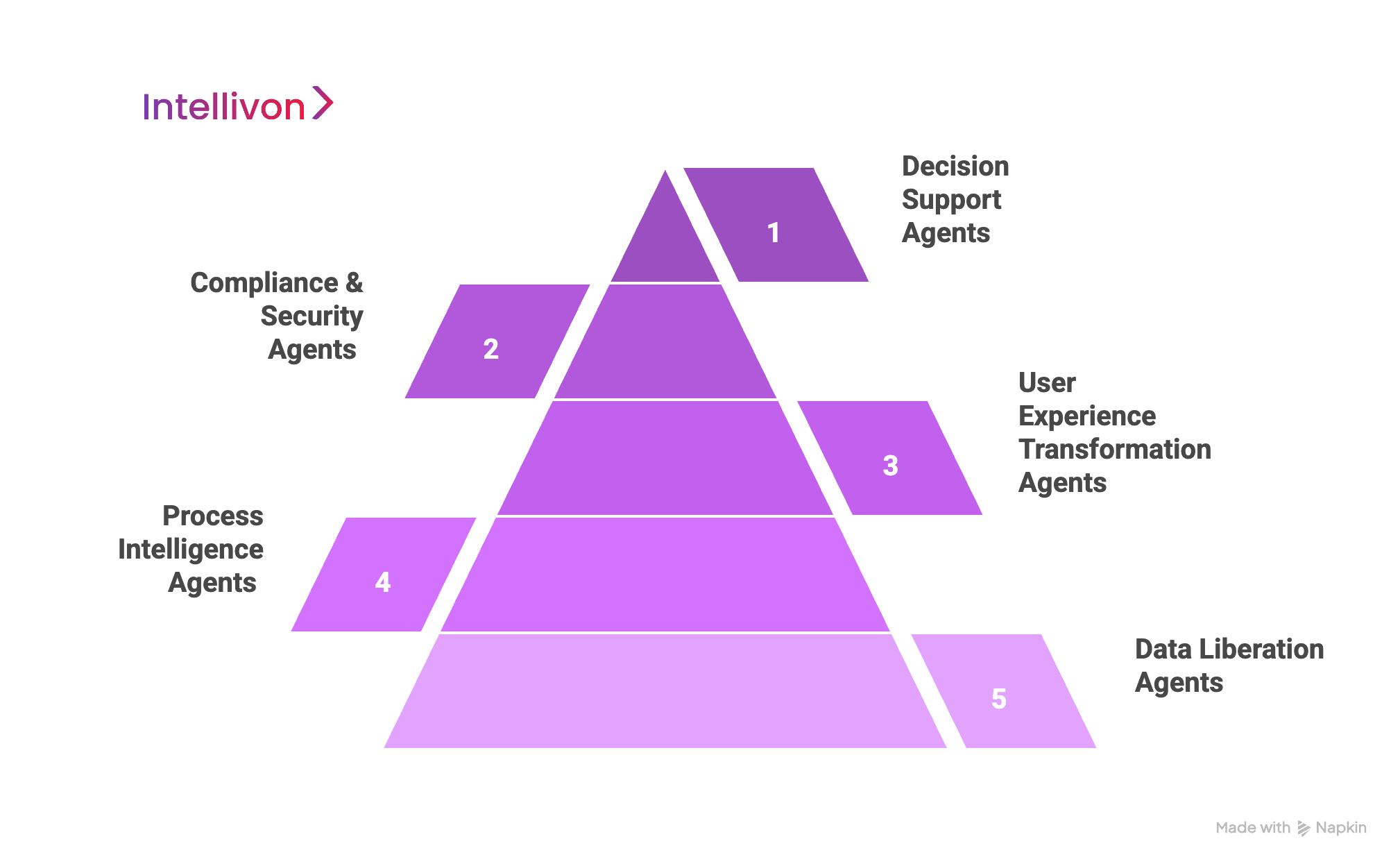
1. Data Liberation Agents
These agents unlock and normalize business-critical data trapped within decades-old ERP systems. They extract structured and semi-structured data from proprietary or obscure formats, whether COBOL-based records or legacy SQL databases. Through real-time pipelines and semantic interpreters, they stream legacy data to modern analytics engines or AI models. Their architecture typically includes API wrappers and microservices bridges, enabling scalable and consistent access to legacy datasets.
2. Process Intelligence Agents
Built to optimize without disruption, these agents observe, analyze, and automate ERP workflows. From predictive maintenance of ERP modules to automated resolution of process exceptions, they increase efficiency while maintaining business continuity. Powered by modular microservices and event-driven architectures, they enable continuous process upgrades without rewriting core ERP code.
3. User Experience Transformation Agents
These agents modernize how users interact with legacy systems. Natural language interfaces and mobile-first capabilities let employees access ERP functions without deep technical know-how. Contextual guidance helps non-technical users complete complex tasks, reducing training costs and boosting system adoption. These agents often deploy through low-code platforms and API gateway routing.
4. Compliance and Security Agents
Designed for high-stakes environments, these agents add modern governance to outdated ERP controls. They provide real-time audit trails, ensure regulatory alignment, and enhance security with MFA and encryption. Their architecture includes modular plug-ins and continuous compliance monitors that work seamlessly with existing workflows.
5. Decision Support Agents
These agents transform decades of legacy ERP data into forward-looking intelligence. By applying AI/ML to historical transaction records, they power predictive models for planning, risk management, and forecasting. Executive dashboards bring fragmented data into unified, real-time views, delivered through AI-powered data pipelines.
Together, these AI agent types form the foundation of ERP AI augmentation, modernizing legacy systems without ripping and replacing them. Through the right architecture, Intellivon enables enterprises to build smarter, faster, and more resilient ERPs.
Building AI Agents Around Your ERP’s Limitations
At Intellivon, we don’t force your ERP to fit the mold of modern systems. Instead, we build AI agents that work with your ERP’s existing architecture, maximizing performance while minimizing disruption. Our approach turns legacy ERP constraints into a strategic foundation for intelligent, scalable transformation.
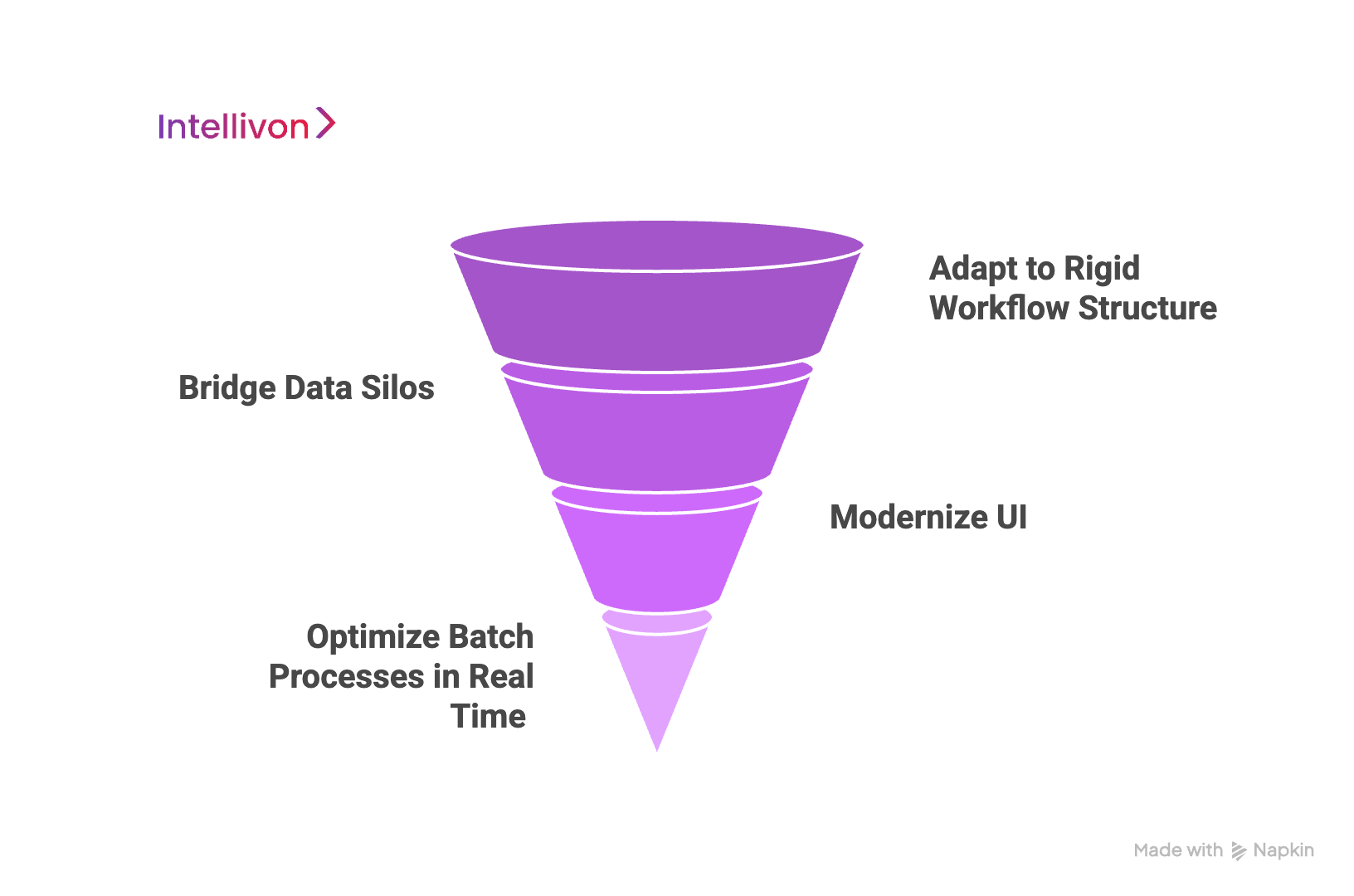
1. Adapt to Rigid Workflow Structures
Legacy ERPs like SAP ECC and Oracle EBS are built on fixed, sequential workflows. Rather than trying to rewire them, Intellivon designs AI agents that fit within those frameworks.
For example, when a purchase order in SAP is stalled due to unavailable approvers, our agents intelligently escalate the request, identify fallback decision-makers, or trigger predefined exception protocols, all without altering the ERP’s core logic. The result is faster throughput, fewer delays, and zero disruption.
2. Bridge Data Silos
ERPs such as JD Edwards often create disconnected data islands across finance, operations, and supply chain. Intellivon’s data liberation agents act as intelligent middleware, monitoring, correlating, and translating siloed data across ERP modules.
We don’t need to rip and replace. Instead, we create semantic bridges that turn fragmented legacy data into unified, real-time insights for better decisions and faster execution.
3. Modernize UI
Legacy ERP user interfaces weren’t built for mobile or conversational workflows. That’s why Intellivon deploys natural language AI agents that overlay your ERP, enabling users to interact with systems using plain language queries like, “Show me outstanding vendor payments.” No need for transaction codes or long navigation paths. We simplify access without rewriting your UI or retraining your teams.
4. Optimize Batch Processes in Real Time
Most legacy ERPs process data in batches, which limits visibility and slows decision-making. Intellivon’s agents continuously monitor these processes, predict completion times, and surface key insights mid-cycle.
That means business users get near real-time intelligence, even when the system itself isn’t designed for it.
Our Strategy
Intellivon doesn’t believe in forcing enterprises to start from scratch. Instead, we build modular, intelligent AI agents around your existing ERP system, preserving the parts that work, enhancing what doesn’t, and accelerating value delivery from day one. This approach enables true ERP AI augmentation, without compliance risk, downtime, or technical overreach.
How We Build AI Agents For Legacy ERPs: A Step-by-Step Guide
At Intellivon, our ERP AI integration process is designed to reduce risk while maximizing long-term business value. We deploy AI agents in six focused phases, each tailored to work with your system’s existing limitations, not against them. This approach enables modular rollout, minimal disruption, and measurable ROI from day one.
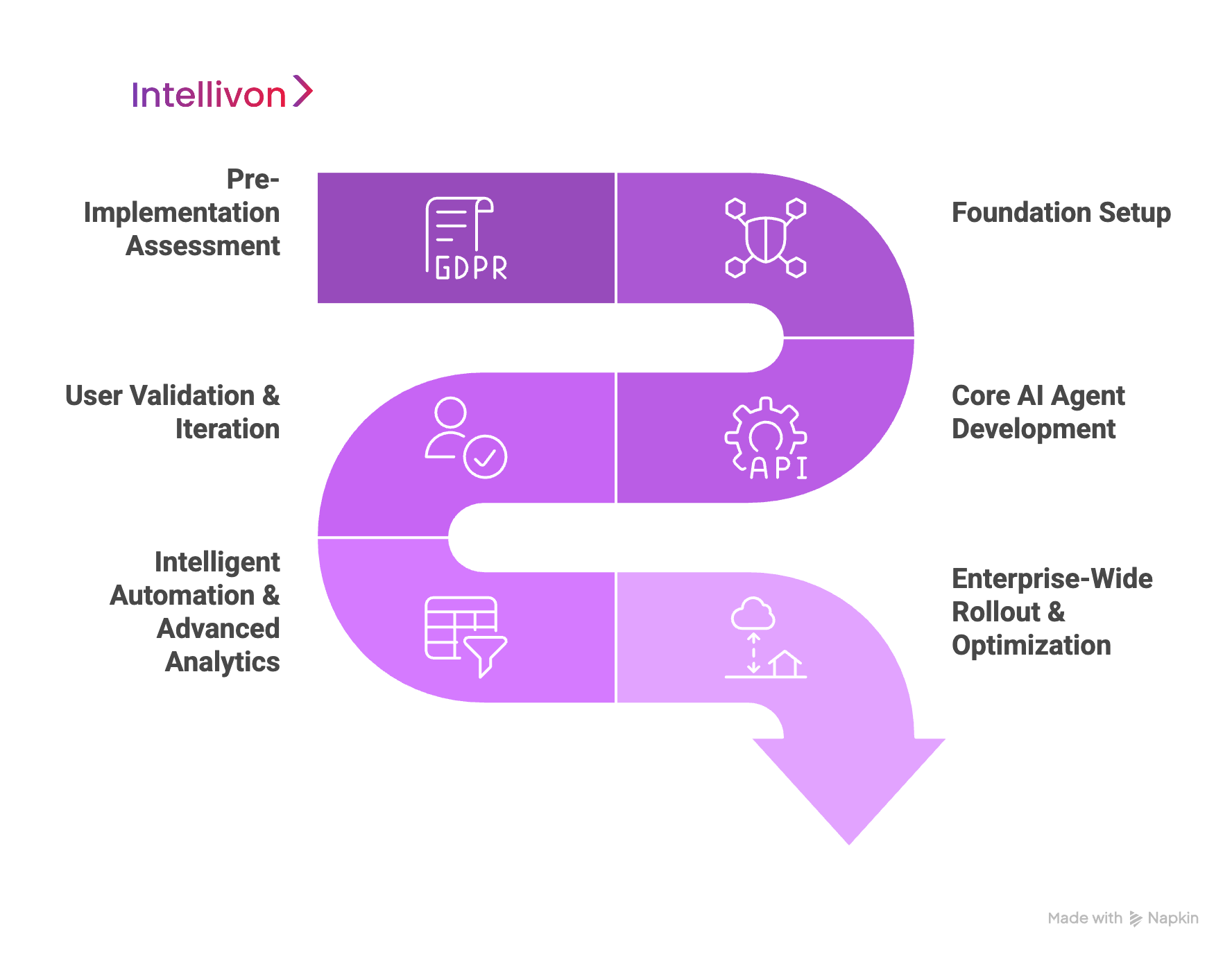
Phase 1: Pre-Implementation Assessment
Before writing a single line of code, we begin with a detailed evaluation.
- Legacy System Health Evaluation
We conduct a 15-point technical audit to assess ERP stability, integration capabilities, and overall readiness for AI deployment. This includes analyzing API exposure, data architecture, and security posture. - Business Process Mapping
Our consultants identify the highest-impact business processes where AI agents can drive measurable efficiency, without requiring deep ERP customization. - Data Quality Assessment
AI only works if the data is reliable. We audit data completeness, consistency, and accuracy to identify cleanup priorities early. - Change Management Readiness
We score the organization’s AI adoption readiness. This includes gauging stakeholder alignment, resistance risk, and communication strategies.
Phase 2: Foundation Setup
We establish secure and scalable connectivity to your legacy ERP environment.
- API Development & Middleware Setup
If APIs are unavailable, we create secure middleware or interpreters to connect AI agents to your ERP modules without altering core functions. - Security Framework Implementation
We implement encryption, authentication protocols, and audit trails, ensuring agents meet enterprise-grade security and compliance standards. - Pilot User Group Identification
We select initial business units to act as early adopters and test AI agents in a controlled environment.
Phase 3: Core AI Agent Development
With the foundation in place, we begin building ERP-specific AI capabilities.
- Custom AI Agent Creation
Agents are developed for targeted ERP modules, such as procurement, finance, HR, or logistics, based on identified business goals. - Integration Testing
We run AI agents through real-time ERP scenarios to ensure they function correctly alongside existing workflows and rules. - Performance Tuning
Our AI experts fine-tunes agent models to handle large enterprise data volumes, ensuring responsiveness and accuracy at scale.
Phase 4: User Validation & Iteration
We move from development to real-world validation with business users.
- User Acceptance Testing (UAT)
Stakeholders interact with agents in live ERP environments. Their feedback informs final adjustments before broader rollout. - UX & Workflow Improvements
We refine the agent interface, navigation logic, and user interactions to reduce friction and drive adoption. - Training & Documentation for Pilot Users
Teams receive playbooks, interactive demos, and support to ensure comfort and confidence in using AI agents daily.
Phase 5: Intelligent Automation & Advanced Analytics
With agents working reliably, we now layer in advanced automation.
- Training AI Models on Historical Data
We feed decades of legacy ERP data into AI models to enable intelligent forecasting, anomaly detection, and decision support. - Deploy Predictive Analytics and Rule Engines
AI agents begin taking intelligent actions, flagging risks, escalating issues, or recommending process adjustments in real time. - Cross-Functional Workflow Optimization
Agents now operate across departments, automating full business workflows and aligning teams around real-time data.
Phase 6: Enterprise-Wide Rollout & Optimization
We expand agent deployment across the enterprise while ensuring long-term value.
- Phased Departmental Rollout
Each business unit adopts AI agents incrementally, allowing tailored support and configuration for different functions. - Advanced Analytics Dashboard Launch
Executives and operations leaders gain access to dashboards showing AI performance, process improvements, and real-time KPIs. - Continuous Monitoring & Optimization
We monitor agent behavior post-deployment, refining models to improve accuracy, performance, and ROI. - Comprehensive Training & Knowledge Transfer
Full-scale training programs and documentation empower internal teams to manage and scale AI systems confidently.
At Intellivon, this phased ERP AI augmentation model lets enterprises modernize at their own pace, without downtime, vendor lock-in, or massive capital risk. Our modular framework ensures that every phase builds toward long-term transformation, supported by measurable wins at every step.
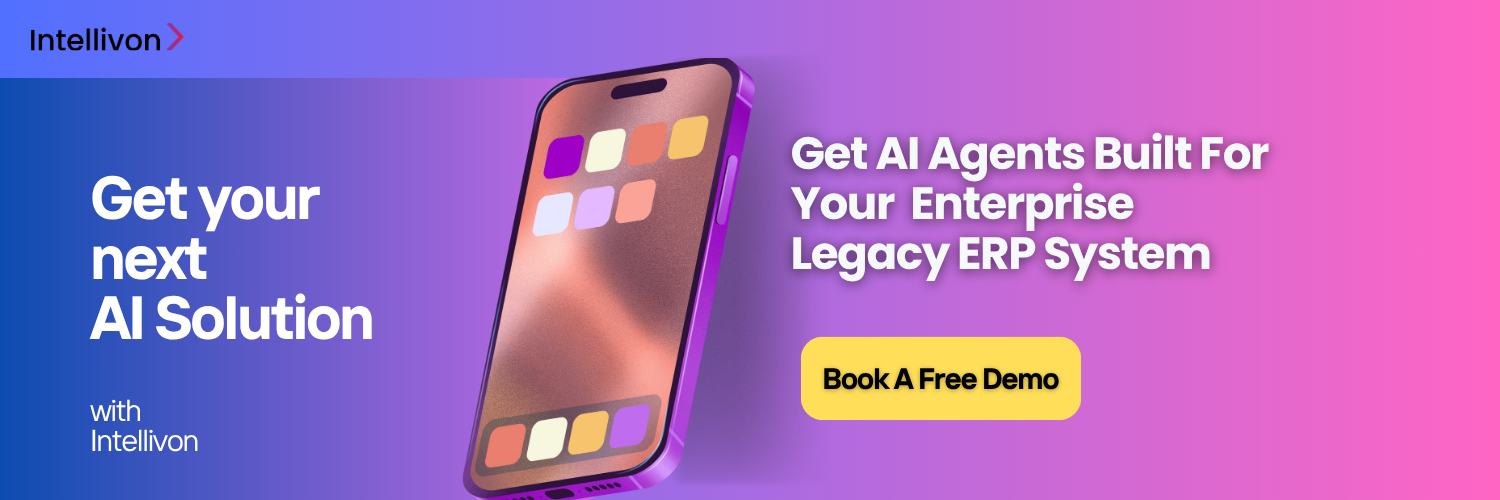
Our MCP Integration Makes ERP AI Agents 10x Smarter
Most AI agents treat legacy ERP systems as transactional endpoints. They follow commands but lack the deeper understanding of business logic, dependencies, and intent. At Intellivon, we integrate Model Context Protocol (MCP) into our ERP AI deployments to change that dynamic, making agents intelligent, adaptive, and context-aware from the start.
1. Context Is the Missing Link in ERP AI
Conventional AI implementations struggle because they operate without full visibility into ERP systems’ inner workings. By integrating MCP, our AI agents don’t interpret how processes interconnect, why workflows exist, and what the downstream implications of every action might be. This level of contextual intelligence dramatically reduces onboarding time and accelerates ROI.
2. Business Logic Awareness
Legacy ERP systems are rarely uniform. They evolve over decades, layered with unique rules, custom workflows, and compliance requirements. Through MCP, Intellivon gives its AI agents the ability to understand and respect these nuances from day one. Agents act with awareness, and not trial and error, making them far more reliable in complex enterprise environments.
3. Actionable Predictive Intelligence
When AI agents understand context, predictions become decisions. MCP allows agents to forecast not only what might happen, but also why it’s happening and what actions should follow. This enables proactive operations, where alerts come with response strategies and insights drive measurable outcomes.
4. Breaking Down ERP Silos
ERP modules often operate in isolation, creating blind spots in automation. MCP integration enables our agents to see across departments and functions, connecting the dots between financial activity, operational events, and supply chain shifts. That system-wide intelligence is essential for next-generation automation.
By integrating MCP into every ERP AI augmentation project, Intellivon delivers agents that align with your architecture, your processes, and your goals, from day one. We don’t force-fit automation. We build intelligence that understands, adapts, and enhances what’s already working. That’s how our clients modernize faster, with lower risk and higher return.
Solving Agentic Challenges in Legacy ERP Systems
Integrating AI agents into legacy ERP systems opens up massive potential, but also surfaces deep-rooted challenges. From outdated architecture and integration barriers to compliance and organizational resistance, these hurdles can derail transformation without the right approach.
At Intellivon, we address these challenges with precision. Our approach blends deep ERP experience with enterprise-grade AI integration strategies that preserve system integrity, enhance capability, and minimize risk.
1. Monolithic Architecture and Technical Debt
Legacy ERPs were built as tightly coupled monoliths, where data, business logic, and user interface are interdependent. Over time, layers of undocumented customizations and workarounds accumulate, creating fragile systems where even small changes can disrupt mission-critical operations.
Intellivon’s Solution:
We begin with a System Readiness Audit, a 15-point assessment that maps dependencies, identifies architectural bottlenecks, and flags high-risk zones. Our engineers then apply a modular integration strategy using microservices and event-driven agents that interact with your ERP system non-invasively, keeping core logic intact.
2. Limited and Inconsistent APIs
Most legacy ERPs lack modern, scalable APIs. Where APIs do exist, they’re often synchronous, undocumented, or incompatible with AI-driven workflows. This severely restricts agent interaction and data exchange.
Intellivon’s Solution:
We build custom middleware and API wrappers that expose ERP functionality in secure, asynchronous formats. These enable AI agents to consume and act on legacy system data without relying on unstable or unavailable endpoints. Our use of API gateways ensures secure, scalable communication between agents and ERP functions.
3. Data Silos and Poor Data Quality
ERP systems often house siloed, inconsistent, or incomplete data, especially across departments. This fragmentation leads to inaccurate AI outcomes, low trust, and limited automation capability.
Intellivon’s Solution:
Our implementation includes data profiling, cleansing pipelines, and semantic data layers that normalize and enrich legacy data before it ever reaches an AI agent. We also help enterprises implement data governance frameworks, ensuring every agent decision is based on high-quality, curated data.
4. Security and Compliance Risks
Legacy systems frequently lack encryption, access controls, or audit capabilities. Introducing AI agents into these environments without safeguards can lead to compliance breaches and data exposure.
Intellivon’s Solution:
We take a security-first approach by embedding role-based access controls (RBAC), end-to-end encryption, and real-time audit logging into every integration layer. Our architecture aligns with GDPR, SOC 2, HIPAA, and ISO 27001 requirements, ensuring safe AI deployment in even the most regulated industries.
5. Organizational Resistance and Change Fatigue
IT teams and business stakeholders often resist AI initiatives due to fear of instability, control loss, or added workload. Without buy-in, even the most advanced solutions stall.
Intellivon’s Solution:
We treat change management as a core deliverable, not an afterthought. Early stakeholder engagement, internal education, and iterative rollouts ensure teams stay informed and aligned. We prioritize early wins, like automating low-risk tasks, to build momentum and trust across the organization.
6. Emerging Trends
Modern tools and methods are making AI agent integration with legacy ERPs faster and safer than ever:
- Low-code integration platforms speed up middleware development with less engineering effort.
- Domain-aware agents learn ERP nuances over time, reducing failure rates and manual oversight.
- Legacy simulation sandboxes allow for safe pre-deployment testing of AI agents in realistic environments.
- Event-driven architectures are helping organizations move from batch updates to real-time agentic intelligence.
Modernizing legacy ERPs with AI agents isn’t about disruption. It’s about augmentation, intelligently working within existing constraints to unlock new capabilities. At Intellivon, we solve the hard problems first, so you can scale AI safely, securely, and strategically.
Future-Proofing Your Agentic ERP System
The enterprise technology landscape is evolving faster than ever. But your AI-agent ERP integration shouldn’t fall behind with every shift. At Intellivon, we build with the future in mind, ensuring your investment stays valuable, scalable, and adaptable for years to come.
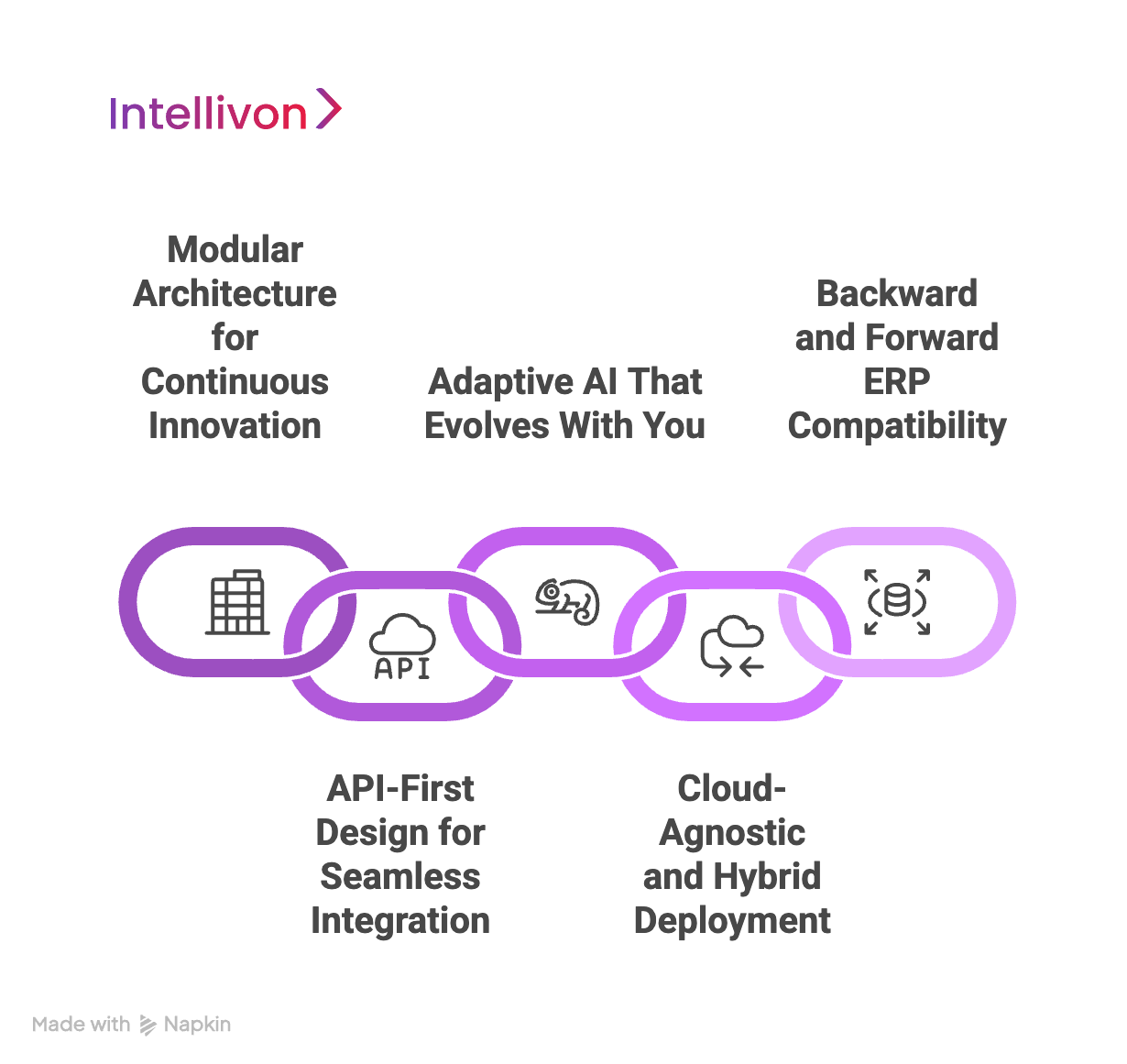
1. Modular Architecture for Continuous Innovation
Our AI agents are developed using a microservices-based architecture. Each function, whether data processing, workflow automation, or analytics, is isolated and independently upgradable. This modularity allows your team to integrate new AI models or business logic improvements without disrupting the ERP core. Enhancements happen incrementally, not disruptively.
2. API-First Design for Seamless Integration
We implement API-first strategies that create secure, standardized interfaces between AI agents and your ERP. These endpoints are designed to work not only with today’s tools but also with emerging technologies like IoT, edge AI, and blockchain. As new systems come online, your ERP doesn’t get left behind.
3. Adaptive AI That Evolves With You
Our agents are built with adaptive learning capabilities. They continuously refine performance based on changing inputs, whether from new processes, regulations, or business conditions. When your company grows, pivots, or merges, your AI agents evolve automatically to support new workflows and compliance requirements.
4. Cloud-Agnostic and Hybrid Deployment
Whether you’re on-premise, fully cloud-based, or somewhere in between, Intellivon’s AI agents deploy flexibly. We support multi-cloud, hybrid, and private infrastructure models, so you’re never locked into a single vendor or ecosystem.
5. Backward and Forward ERP Compatibility
Our integration protocols maintain compatibility with legacy ERP systems while ensuring readiness for future upgrades. Whether you migrate from SAP ECC to S/4HANA or update to a new Oracle release, your agents migrate with you, no redevelopment required.
At Intellivon, we ensure your ERP becomes an intelligent, continuously evolving platform ready to adapt to whatever comes next.
When to Augment vs. Replace Legacy ERP Systems
In today’s enterprise landscape, the most critical decision isn’t whether to modernize, it’s how. Choosing the wrong modernization strategy can lead to delayed projects, productivity loss, and budget overruns that ripple across the business. At Intellivon, we help clients avoid this by guiding them through a structured modernization framework.
Not all legacy ERP systems are created equal. Some represent years of strategic investment, while others have simply outlived their usefulness. The key is to identify whether your ERP system is a foundation to build on, or a bottleneck to retire.
Choose AI Augmentation When:
- Your ERP system has over 10 years of critical customizations
- System uptime must remain at or above 99.9%
- You depend on 50+ external integrations for core operations
- Proprietary workflows offer competitive advantage
- The implementation window is under 12 months
- Budget favors incremental OPEX over large-scale CAPEX
Consider ERP Replacement When:
- The ERP’s core architecture no longer supports current business needs
- Technical debt consumes more than 60% of the IT budget
- Vendor support is being discontinued or is no longer viable
- You face unpatchable security vulnerabilities
- System cannot scale to support 3× current capacity
ERP Modernization Comparison Table
| Criteria | AI Augmentation | ERP Replacement |
| Custom Business Logic | Retain and extend | Likely lost or rebuilt |
| System Uptime Requirements | 99.9%+ achievable | Potential downtime |
| Time to Implement | < 12 months | 12–24 months or longer |
| Budget Model | OPEX-friendly | High CAPEX investment |
| Integration Complexity | Works with existing systems | Requires re-integration |
| Risk of Disruption | Low | High (during transition) |
| Technical Debt | Manageable within ERP | Exceeds manageable thresholds |
| Competitive Differentiation | Preserved and enhanced | Often reset or redefined |
| Compliance Impact | Minimal | Requires full recertification |
| Long-Term Scalability | Moderate to high | High (post-transition) |
We don’t believe in one-size-fits-all ERP strategies. Our phased augmentation model gives you the flexibility to modernize at your own pace, with minimal disruption and maximum ROI.
Ready to Deploy AI Agents Without Disrupting Your ERP?
With over 11 years of enterprise AI experience and more than 500 successful AI deployments across Fortune 1000 companies, Intellivon is your trusted partner in building scalable, intelligent AI agents for legacy ERP modernization. We help you breathe intelligence into your ERP, without risking downtime, compliance, or ROI.
What Sets Intellivon Apart?
- Modular AI Architecture: We design and build language-agnostic, modular AI agents that integrate seamlessly with your ERP, CRM, and data infrastructure, whether on-prem, cloud, or hybrid.
- Industry-Grade AI Technology: From NLP-based user interfaces to predictive analytics and anomaly detection, our agents bring state-of-the-art machine learning into legacy ERP workflows, without rewriting a single line of your base code.
- Seamless Enterprise Integration: Intellivon’s AI agents are built to work across complex, distributed enterprise ecosystems. We support multi-region deployments, regulatory alignment (GDPR, SOC 2, ISO 27001), and integration with 50+ enterprise systems.
- User-Centric Change Management: We ensure adoption through dedicated onboarding, intuitive interfaces, and multilingual training tailored for business and IT users alike.
- 24/7 SLA-Based Support: Our enterprise-grade support team works round-the-clock to monitor, optimize, and evolve your AI agents. You’re never alone, whether it’s during rollout or scaling.
We help enterprises breathe intelligence into legacy ERPs, without risking downtime, compliance, or ROI. Let’s build your first AI agent together. Contact our ERP AI consulting team now for a full readiness assessment.

FAQ’s
Q1. How long does it take to deploy one AI agent?
Deployment timelines vary based on your ERP environment, the complexity of the use case, and integration requirements. However, most AI agents can be developed, tested, and deployed within 4 to 6 weeks using Intellivon’s phased integration model. For simpler use cases (e.g., reporting automation or invoice validation), the timeline can be even shorter.
Q2. What if our ERP has no APIs?
No problem. Many legacy ERP systems lack modern APIs, or have limited, poorly documented ones. At Intellivon, we use a combination of secure middleware, RPA (Robotic Process Automation), and event-driven connectors to create integration bridges. This allows AI agents to interact with your ERP system without requiring native API access.
Q3. Will this require vendor approval?
In most cases, vendor approval is not required. Intellivon’s AI agents operate as an augmentation layer, working externally via secure interfaces. We do not alter the core ERP codebase. This approach ensures vendor warranties and support agreements remain intact while still enabling deep functionality.
Q4. How is data privacy ensured across regions?
Data privacy is built into our deployment architecture. Intellivon’s AI agents support role-based access control (RBAC), end-to-end encryption, and region-specific data handling policies. We align with global compliance frameworks such as GDPR, SOC 2, and ISO 27001, ensuring sensitive data, whether financial, HR, or operational, is protected and auditable.
Q5. What support does Intellivon provide post-deployment?
Our enterprise clients receive 24/7 SLA-backed support, access to dedicated solution architects, and ongoing performance monitoring. We also offer continuous AI model tuning, feedback loop integration, and quarterly optimization reviews to ensure your AI agents stay aligned with business goals and evolving compliance needs.

